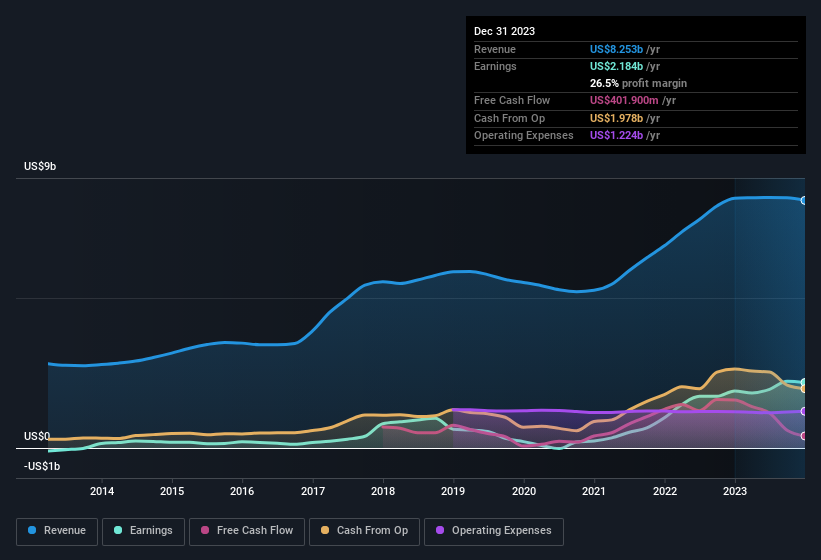- United States
- /
- Semiconductors
- /
- NasdaqGS:ON
ON Semiconductor's (NASDAQ:ON) Profits Appear To Have Quality Issues

The market for ON Semiconductor Corporation's (NASDAQ:ON) stock was strong after it released a healthy earnings report last week. While the profit numbers were good, our analysis has found some concerning factors that shareholders should be aware of.
See our latest analysis for ON Semiconductor

A Closer Look At ON Semiconductor's Earnings
Many investors haven't heard of the accrual ratio from cashflow, but it is actually a useful measure of how well a company's profit is backed up by free cash flow (FCF) during a given period. In plain english, this ratio subtracts FCF from net profit, and divides that number by the company's average operating assets over that period. You could think of the accrual ratio from cashflow as the 'non-FCF profit ratio'.
Therefore, it's actually considered a good thing when a company has a negative accrual ratio, but a bad thing if its accrual ratio is positive. That is not intended to imply we should worry about a positive accrual ratio, but it's worth noting where the accrual ratio is rather high. To quote a 2014 paper by Lewellen and Resutek, "firms with higher accruals tend to be less profitable in the future".
Over the twelve months to December 2023, ON Semiconductor recorded an accrual ratio of 0.24. We can therefore deduce that its free cash flow fell well short of covering its statutory profit. In fact, it had free cash flow of US$402m in the last year, which was a lot less than its statutory profit of US$2.18b. ON Semiconductor shareholders will no doubt be hoping that its free cash flow bounces back next year, since it was down over the last twelve months.
That might leave you wondering what analysts are forecasting in terms of future profitability. Luckily, you can click here to see an interactive graph depicting future profitability, based on their estimates.
Our Take On ON Semiconductor's Profit Performance
ON Semiconductor's accrual ratio for the last twelve months signifies cash conversion is less than ideal, which is a negative when it comes to our view of its earnings. Because of this, we think that it may be that ON Semiconductor's statutory profits are better than its underlying earnings power. But the good news is that its EPS growth over the last three years has been very impressive. At the end of the day, it's essential to consider more than just the factors above, if you want to understand the company properly. With this in mind, we wouldn't consider investing in a stock unless we had a thorough understanding of the risks. At Simply Wall St, we found 1 warning sign for ON Semiconductor and we think they deserve your attention.
Today we've zoomed in on a single data point to better understand the nature of ON Semiconductor's profit. But there are plenty of other ways to inform your opinion of a company. For example, many people consider a high return on equity as an indication of favorable business economics, while others like to 'follow the money' and search out stocks that insiders are buying. While it might take a little research on your behalf, you may find this free collection of companies boasting high return on equity, or this list of stocks that insiders are buying to be useful.
New: AI Stock Screener & Alerts
Our new AI Stock Screener scans the market every day to uncover opportunities.
• Dividend Powerhouses (3%+ Yield)
• Undervalued Small Caps with Insider Buying
• High growth Tech and AI Companies
Or build your own from over 50 metrics.
Have feedback on this article? Concerned about the content? Get in touch with us directly. Alternatively, email editorial-team (at) simplywallst.com.
This article by Simply Wall St is general in nature. We provide commentary based on historical data and analyst forecasts only using an unbiased methodology and our articles are not intended to be financial advice. It does not constitute a recommendation to buy or sell any stock, and does not take account of your objectives, or your financial situation. We aim to bring you long-term focused analysis driven by fundamental data. Note that our analysis may not factor in the latest price-sensitive company announcements or qualitative material. Simply Wall St has no position in any stocks mentioned.
About NasdaqGS:ON
ON Semiconductor
Provides intelligent sensing and power solutions in the United States and internationally.
Very undervalued with flawless balance sheet.


